The Shaker Bubble Has Burst
The “Shaker Bubble” is the idea that Shaker students are sheltered by the community’s liberalism. This assumes the Shaker experience is one unconditionally untainted by bigotry, and it can discredit a student’s opinion on discrimination within the bubble. I first learned about the “Shaker Bubble” during classroom visits from SGORR in sixth grade, and I sometimes use the term now as a SGORR leader. While it’s true that Shaker students grow up with a profoundly liberal experience in our schools, this term is painfully inaccurate, and no event exposed this fact better than last Thursday’s community meeting.
As of that meeting, I can no longer refer to the “Shaker Bubble,” because it has officially burst.
Anyone who attended the meeting will concur, and for those who missed out, here’s what happened. This community meeting was supposed to be the administration’s response to the recent turmoil regarding the four SHHS employees who have either resigned, been fired or placed on administrative leave since Oct. 10. Teachers, students, residents and parents packed the large auditorium expecting answers, but instead left angrier than they came — and they came angry.
Protest began as soon as the format of the meeting was introduced. The moderator, Executive Director of Communications Scott Stephens, said attendees were to write their questions on index cards, and to pass them to the aisles, where they’d be picked up and brought to the podium. Before Stephens could even finish describing the process, a parent marched to the edge of the stage, and screamed, “Our questions will not be censored!” The proctor brushed her aside, but her concerns foreshadowed the administration’s troubles to come.
Throughout the meeting Dr. David Glasner, substitute principal, Dr. Stephen Wilkins, interim superintendent, and Stephens refused to disclose further information about the situations regarding SHHS employees – and wouldn’t even refer to Jody Podl or Jonathan Kuehnle by name until late in the meeting. One man was escorted out due to his passionate yelling. Then, as if the night wasn’t complicated enough, the meeting turned to race.
This shift occurred when senior Brianna Jarrell marched onto the stage and inquired about the locking of the egress after school, which she described as discrimination against black students. She said that the administration believes “black students are always up to something.” The administration was unable to sufficiently answer her questions, which only fanned the red hot flames of anger. The meeting then turned to parents arguing over the intent of the meeting, incoherent shouting from attendees, and, ultimately, chaos. This chaos was a gift to the administrators because it wasted time during the one-hour meeting – which we left angry, embarrassed and hurt by the administration’s handling of crisis.
The meeting can be described in a wide range of ways. Some will call it “ugly” or “embarrassing,” while others will revel in the chaos it caused, but I think it was undeniably necessary. This meeting brought to light the dark side of diversity because it showed that different people face different issues. While many white parents of our community may be infuriated by the persecution of Ms. Podl, many black parents of our community are upset about discrimination against their children, and both groups’ outrage — along with any other group in between — is valid. While it’s true that race wasn’t the intended subject of the meeting – and I don’t personally share discriminatory experiences – it’s beyond immature to invalidate those feelings. One may disagree with the method used to bring them up, but you cannot reasonably say that those students didn’t have the right to voice their concerns. Shaker is a community where not everyone is solely invested in one issue at a time, because the Shaker experience is too multifaceted for a “one size fits all” approach to problem solving. Each experience is distinct and important.
Ultimately, I don’t know how the administration should solve these problems, as they’re extremely complex. What I do know is that despite the chaos, I’ve never been more proud of Shaker. The administration assumed that they could just sweep this conflict under the rug with empty answers to loaded questions, but we proved them wrong. We’re not a community that can be stepped on, and in this crisis, it’s obvious that the administration doesn’t have the answers. The undeniable truth is that the problems we’re facing have existed long before Thursday’s meeting, and if we don’t do anything to fix them, they’ll exist long after. So now is a time where we must make a choice: We can disregard this meeting as an embarrassment, or we can use it as a chance to open dialogue to heal our community. Either way, the “Shaker Bubble” no longer exists. I’m sure that we’ll make the right decision, but only time will tell if our community can find answers through solidarity.
Fryer is a member of CORE, the leadership of the Student Group on Race Relations. He is also a drama leader and head script writer for Sankofa. He is a senior at the high school. Guest ‘Rites and Letters to the Editor can be sent to shakeriteserver@gmail.com and the current editor-in-chief, who can be reached at astridkbraun@gmail.com. The Shakerite reserves the right to reject any Guest ‘Rites or Letters to the Editor.


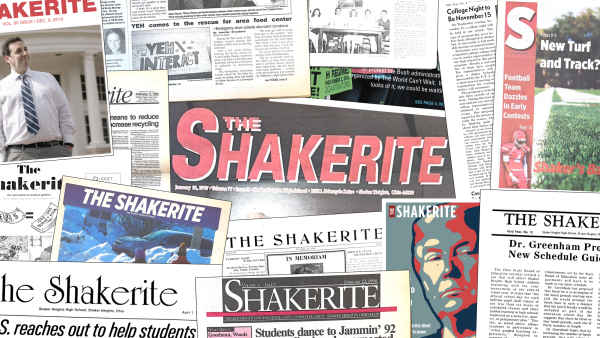
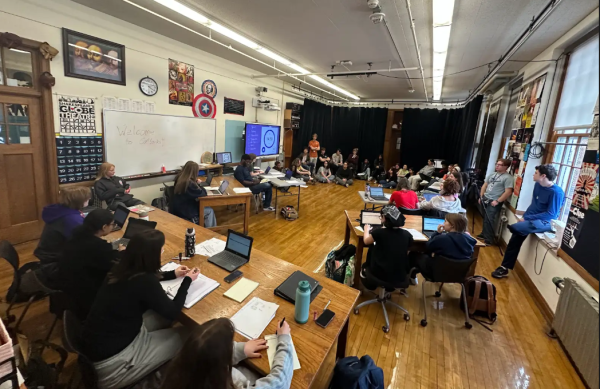
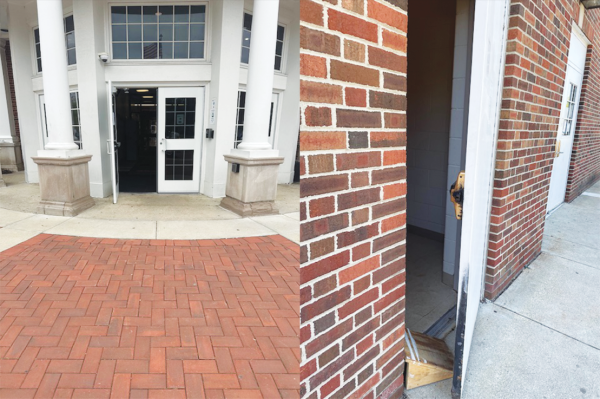
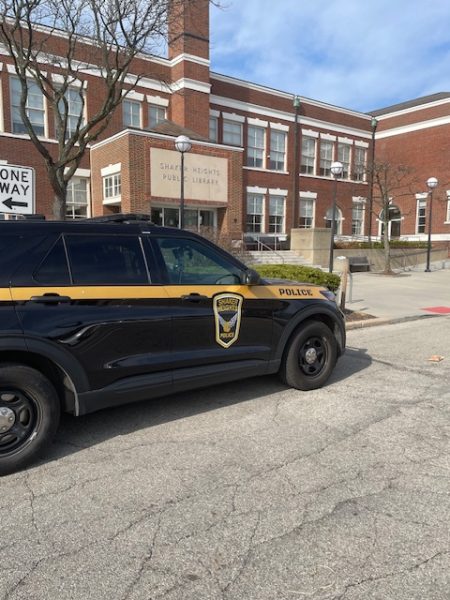
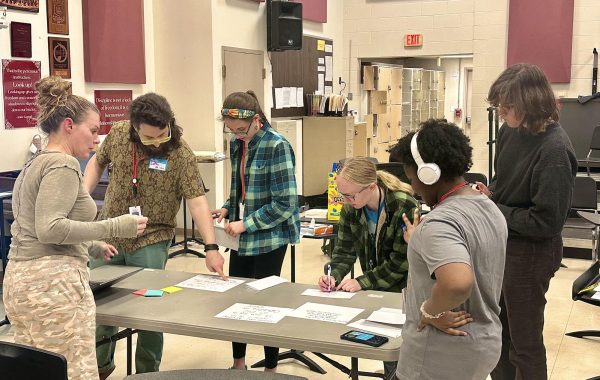
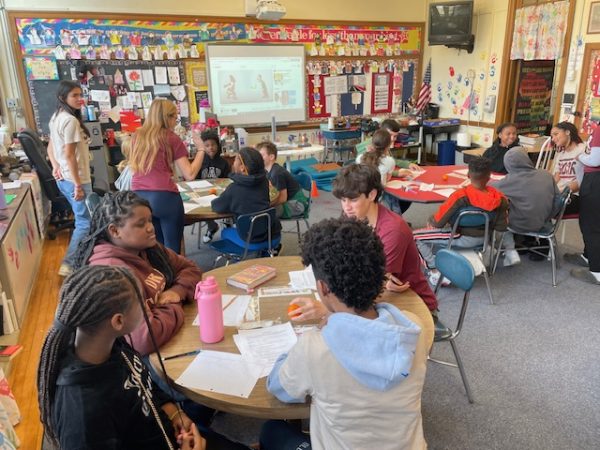
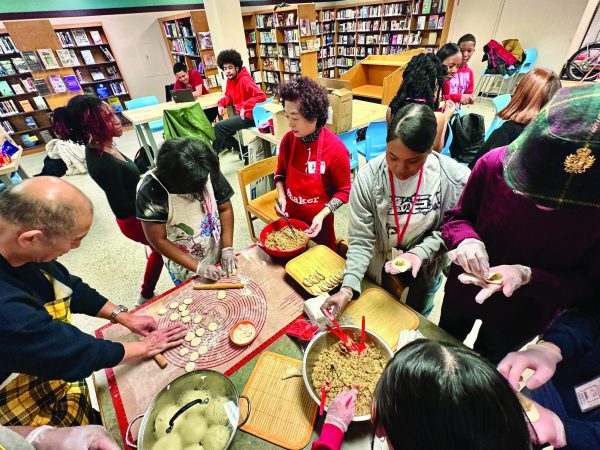
RJ Pace | Nov 16, 2018 at 12:02 am
I graduated from Shaker almost 20 years ago without realizing how much of a treasure it was until I moved away to start my own family. Now that I have observed other school districts, I feel fortunate to have matriculated in such a unique, diverse environment with such rich resources. It wasn’t perfect but it provided us with ample opportunity to reach our potential.
Things may have changed and challenges may persist, but I’m quite proud that a student run high school newspaper has garnered such relevancy. You students are doing a phenomenal job and are developing real-world skills related to journalism, marketing, blogging, etc. I live across the country and wouldn’t even know the latest occurrences at Shaker if it were not for your publication.
Kathleen O'Connell Sauline | Nov 15, 2018 at 4:56 am
Thank you. Your article is deep and rich with insight. It reminds me of this poem:
Let America Be America Again
Langston Hughes, 1902 – 1967
Let America be America again.
Let it be the dream it used to be.
Let it be the pioneer on the plain
Seeking a home where he himself is free.
(America never was America to me.)
Let America be the dream the dreamers dreamed—
Let it be that great strong land of love
Where never kings connive nor tyrants scheme
That any man be crushed by one above.
(It never was America to me.)
O, let my land be a land where Liberty
Is crowned with no false patriotic wreath,
But opportunity is real, and life is free,
Equality is in the air we breathe.
(There’s never been equality for me,
Nor freedom in this “homeland of the free.”)
Say, who are you that mumbles in the dark?
And who are you that draws your veil across the stars?
I am the poor white, fooled and pushed apart,
I am the Negro bearing slavery’s scars.
I am the red man driven from the land,
I am the immigrant clutching the hope I seek—
And finding only the same old stupid plan
Of dog eat dog, of mighty crush the weak.
I am the young man, full of strength and hope,
Tangled in that ancient endless chain
Of profit, power, gain, of grab the land!
Of grab the gold! Of grab the ways of satisfying need!
Of work the men! Of take the pay!
Of owning everything for one’s own greed!
I am the farmer, bondsman to the soil.
I am the worker sold to the machine.
I am the Negro, servant to you all.
I am the people, humble, hungry, mean—
Hungry yet today despite the dream.
Beaten yet today—O, Pioneers!
I am the man who never got ahead,
The poorest worker bartered through the years.
Yet I’m the one who dreamt our basic dream
In the Old World while still a serf of kings,
Who dreamt a dream so strong, so brave, so true,
That even yet its mighty daring sings
In every brick and stone, in every furrow turned
That’s made America the land it has become.
O, I’m the man who sailed those early seas
In search of what I meant to be my home—
For I’m the one who left dark Ireland’s shore,
And Poland’s plain, and England’s grassy lea,
And torn from Black Africa’s strand I came
To build a “homeland of the free.”
The free?
Who said the free? Not me?
Surely not me? The millions on relief today?
The millions shot down when we strike?
The millions who have nothing for our pay?
For all the dreams we’ve dreamed
And all the songs we’ve sung
And all the hopes we’ve held
And all the flags we’ve hung,
The millions who have nothing for our pay—
Except the dream that’s almost dead today.
O, let America be America again—
The land that never has been yet—
And yet must be—the land where every man is free.
The land that’s mine—the poor man’s, Indian’s, Negro’s, ME—
Who made America,
Whose sweat and blood, whose faith and pain,
Whose hand at the foundry, whose plow in the rain,
Must bring back our mighty dream again.
Sure, call me any ugly name you choose—
The steel of freedom does not stain.
From those who live like leeches on the people’s lives,
We must take back our land again,
America!
O, yes,
I say it plain,
America never was America to me,
And yet I swear this oath—
America will be!
Out of the rack and ruin of our gangster death,
The rape and rot of graft, and stealth, and lies,
We, the people, must redeem
The land, the mines, the plants, the rivers.
The mountains and the endless plain—
All, all the stretch of these great green states—
And make America again!